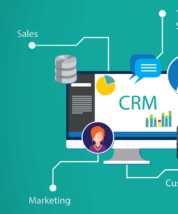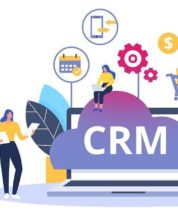Introduction
In a market where clients are increasingly demanding and where options are more numerous than ever, it is essential for companies to find ways to stand out from their competitors. Achieving this requires a data-driven and agile strategy that not only attracts new clients but also preserves, maintains, and builds loyalty among those already aligned with your brand.
What is a CRM Strategy?
The acronym "CRM" stands for "Customer Relationship Management." More than just a simple contact management tool, a CRM is a strategic solution that optimizes both customer and business relationships for a company. By automating and centralizing interactions with clients (and prospects), a CRM allows you to deliver a seamless and personalized customer experience.
Nowadays, companies rely on CRM to collect information about their clients, automate marketing campaigns, and track sales cycles. CRM also enhance customer service and provide a better understanding of the "customer journey" as a whole.
Why adopt a CRM Strategy?
A well-thought-out CRM strategy provides several key advantages essential for a company’s growth:
- Qualify and segment prospects: A CRM helps you better understand your clients and prospects, segmenting them according to their behaviors and specific needs.
- Collect relevant data: Information gathered through a CRM enables a company to better target its sales (and marketing) efforts.
- Automate repetitive tasks: By automating certain repetitive tasks (like email campaigns or follow-up reminders), companies significantly increase their efficiency.
- Deliver an improved customer experience: Beyond relevance, a CRM enables you to offer personalized interactions at each stage of the "customer journey."
- Increase Sales and Build Loyalty: By optimizing internal processes, CRM usage also improves conversion rates and strengthens customer loyalty.
Which type of CRM should you choose?
Unsurprisingly, there are several types of CRM available today, each with features suited to specific needs:
1. Operational CRM
This is the most widespread type of CRM. It focuses on automating processes in sales, marketing, and customer service. Operational CRMs are particularly effective in managing daily client interactions, from lead generation to sales cycle management, including sales process automation (lead tracking, follow-up reminders, sales force management) and marketing automation (automatic launch of email campaigns, identifying leads for targeted actions).
Example of use: As soon as a prospect views a specific product page on your website, a personalized follow-up email is automatically sent, and a sales representative is notified for a potential follow-up call.
2. Analytical CRM
As its name suggests, this type of CRM centers on customer data analysis. It helps better understand buying behaviors and identify trends, allowing for commercial and strategic marketing optimization. With detailed reports, it provides a clear view of the company’s performance.
Example of use: A retailer can use these insights to determine that specific customer segments prefer buying during sales periods, adjusting seasonal offerings accordingly.
3. Collaborative CRM
When it comes to facilitating information sharing across teams (sales, marketing, customer service, etc.), the collaborative CRM is the ideal candidate. This type of CRM aims to deliver a consistent, harmonious customer experience across all communication channels (phone, email, social media, etc.).
Example of use: When a customer contacts support, the representative can instantly view recent marketing interactions (emails, offers received, etc.) to tailor the conversation and provide better-targeted assistance.
What are the steps to creating an effective CRM Strategy?
1. Define a vision and objectives
The first and arguably most important step is to articulate a clear vision of what you want to achieve long-term with your clients. This vision should balance foresight (how you foresee customer relationships evolving) and alignment (with the company’s core values and mission).
Next, define a series of objectives directly tied to your company’s strategy. These could include revenue growth, churn reduction, or improved customer satisfaction…
2. Define your Buyer Personas
A buyer persona is a detailed, though fictional, representation of your ideal client based on insights and real data. This representation is crucial to understanding and anticipating the needs and expectations of your target customers. Creating buyer personas is particularly beneficial in developing an effective CRM strategy, especially when it comes to targeted marketing actions and fostering long-term relationships. For more information, see our article: “How to Create Your Buyer Persona.”
3. Map out the Customer Journey
To offer an optimal customer experience, it’s essential to understand all the stages a customer goes through when interacting with your company - from initial contact to post-purchase loyalty. This journey comprises key moments that you can highlight and enhance. This detailed approach also enables you to identify critical moments where a customer might disengage or, conversely, deepen their commitment. Understanding this journey is key to delivering a smooth, consistent experience at each stage. For more details, check out our article “Customer Journey Map – what is it and why is it important.”
4. Implement a multichannel experience
In an increasingly digitalized environment, clients now expect to interact with companies across multiple channels (email, social media, SMS, push notifications, etc.). It’s crucial to structure your internal processes to harmonize these interactions, thus providing a coherent omnichannel experience. This ensures a smooth communication flow without untimely disruptions, regardless of the touchpoint. Beyond centralizing data (making it accessible to each team), this may also involve auditing resources and responsibilities internally to ensure your strategy’s efficiency.
5. Thoroughly understand your product or service
An effective CRM strategy also relies on a deep understanding of your product or service. This includes emphasizing its added value, competitive advantages, and unique characteristics. This thorough knowledge allows you to communicate more effectively, tailoring messages to meet the expectations of clients (or prospects) through a clear, coherent message consistently relayed across channels.
6. Invest in the Right CRM Software
A powerful CRM system within a company acts much like a conductor for musicians. Just as a skilled conductor ensures that every musician and instrument plays at the right moment and place, a robust CRM synchronizes efforts across different teams, harmonizing interactions by centralizing data and automating tasks to ensure optimal cohesion in client relations.
Choosing the right tool is thus a crucial element that should not be taken lightly. Make sure the CRM software integrates seamlessly with your company’s existing systems and provides features tailored to your needs, considering your current and future objectives, team size, and the complexity of your business activities.
7. Track Key Performance Indicators (KPIs)
Finally, it’s essential to establish key performance indicators to regularly measure your CRM strategy’s effectiveness and make informed decisions about your processes. Examples of KPIs to monitor include customer satisfaction, retention rate, churn rate, and, of course, the revenue generated by your various marketing campaigns.
To ensure KPIs are genuinely useful, they must be S.M.A.R.T. (Specific, Measurable, Achievable, Realistic, and Time-bound). Take the time to establish them carefully so they reflect the objectives of your CRM strategy as accurately as possible.
Conclusion
In an ultra-competitive market, implementing a well-structured CRM strategy is an essential lever for standing out and building strong, long-lasting relationships with your clients. By centralizing data, automating processes, and regularly measuring performance with specific, measurable, achievable, realistic, and time-bound KPIs, you will be able to create a coherent and personalized customer experience that fosters client loyalty and drives company growth.
At Eminence, we understand the importance of a high-performance CRM strategy tailored to your specific needs. With our expertise in digital marketing and data management, we help you implement customized and optimized CRM solutions to maximize your business performance and strengthen client engagement. Whether you need advice on choosing CRM software or assistance in analyzing and utilizing client data, our team offers tailored strategies to help you make the most of your client relationships.





